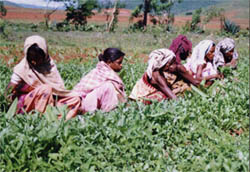NATURAL DYES
Sustainable Agriculture Programmes
IRDWSI implemented sustainable agricultural programmes in fourteen villages within the vicinity of Semiliguda Block. The villages taken up under the sustainable agricultural programmes include Porja Pungar, Khond Pungar, Khajuri Pungar, Khond Srimunda, Bondaguda, Tentuli Guda, Putsil, Barakotni, Chickolma(Phulbondh, Tiyapar, Ponasput, Guilel and Nuapaut. Among these, the team developed Porja Pungar as a model agricultural village.
Village Visits & Farmers Training
The core team visited all the fourteen villages in the past one year. During this period, they conducted regular meetings with the farmers and discussed issues on crop types, position, problem and erratic calamities escalating in the process. They invigorated the method of preparing and applying organic manure, organic pesticides, preventive methods, means of accumulating indigenous seeds, preservation of indigenous 3eeds etc. Emphasis was given on the practice of indigenous seeds and local manure. They were advised to refrain from using hybrid seeds and chemical fertilisers in their respective agricultural farms. Common crops that flourishes in the village precinct comprised of paddy, ragi, suan, niger, cabbage, cauliflower, potato, tomato, chilly, beans, brinjal, pumpkin, cucumber, carrot, ginger, turmeric etc. Moreover, in every village the team instructed the farmers on the following points:
Preparation and use of organic manure and organic pesticides in their agricultural farms, Inter crop (Due to the practice of inter cropping farmers were accumulating more income from their small piece of land), Cultivate cash crops like ginger and turmeric, Use of traditional seeds, Preservation of traditional seeds, Maintenance of compost pits, Land preparation, Stone bunding, Vegetable cultivation, Weeding, cleaning, application of manure and watering
 |
 |
Seedling Supply
Last year the project provided seedlings to 10 farmers from two villages ( Porja Pungar & Khond Pungar). The cultivation goes on very well. Proper care has been taken to ensure its long term sustainability. Details of the farmers are as follows: List of Farmers Tomato Seedlings Distributed
| Sl.No |
Name of the farmers |
Sex |
Age |
Community |
Village |
| 1 | Mukunda Nayak | M | 29 | Porja | Porja Pungar |
| 2 | Punba Nandiwali | M | 28 | -do- | -do- |
| 3 | Chaitan Nayak | M | 32 | -do- | -do- |
| 4 | Pordesi Bhoi | M | 26 | -do- | -do- |
| 5 | Sodam Dolei | M | 31 | -do- | -do- |
| 6 | Singru Hontal | M | 28 | kond | kond Pungar |
| 7 | Krushna Hontal | M | 25 | -do- | -do- |
| 8 | Kesu Hontal | M | 27 | -do- | -do- |
| 9 | Boli Hontal | M | 31 | -do- | -do- |
| 10 | Loke Hontal | M | 24 | -do- | -do- |
Demonstration Field
The core team set up demonstration field at office premises for the multiplication and regeneration of indigenous seeds. The centre has been functioning under the able guidance of Mr. A.K.Senapati, an eminent scientist of Krishi Vigyan Kendra, OUAT, based in Semiliguda. At the demonstration field plants like ginger, turmeric, potato, tomato, chilly and capsicum etc. are grown by applying organic manure. Utmost care has been ensured to obtain optimal output from this garden. Maintenance work of weeding, cleaning, watering etc. continued on daily basis without any deterrents.
Extension Area Visit
Staff visited the extension area of Pottangi and taught the people from the village of Gangamguda, Gudiamguda and Almariguda on the following areas:
- - Land preparation
- - Stone bounding
- - Vegetable cultivation
- - Inter cropping
- - Compost pits
- - Cash crops cultivation (ginger & turmeric)
- - Preservation of traditional seeds
In Gangamguda and Gudiamguda the project provided turmeric seeds to 3 farmers. The group imparted the technique and method of harvesting more from their paltry vegetable gardens with the use sustainable agricultural inputs. Farmers who received turmeric seed are as follows:
Name, sex, age, community, village and amount of turmeric seeds provided.
| Sl.No |
Name |
Sex |
Age | Community | Village | Quantity (Kg) |
| 1 | Gunta Katur | M | 33 | Khond | Gangamaguda | 17 |
| 2 | Gunta Narsi | M | 30 | Khond | Gangamaguda | 17 |
| 3 | Geti Patana | M | 30 | Dora | Gangamaguda | 16 |
Mushroom Demonstration
In two villages - Khond Pungar and Poda Pungar mushroom demonstration was organised. From Krishi Vigyan Kendra, Semiliguda 15 bottles of Mushroom Spawn was collected and used for demonstration purpose. 15 farmers were educated to take up the mushroom cultivation. Now the trained farmers are doing the same programme in their villages. During last six months 14.100 Kilo Grams Mushroom was harvested by the farmers. Details are given below: List of Farmers Tomato Seedlings Distributed
| Sl.No | Village | Name of the farmers | sex | Quantity Harvested |
| 1 | Khond Pungar | Krushna hontal | M | 800 gms |
| 2 | Moheswar hontal | M | 1.00kg | |
| 3 | Singru Hontal | M | 1.2 gms | |
| 4 | Hari Hontal | M | 600 gms | |
| 5 | Kama Hontal | M | 900 gms | |
| 6 | Kesu Hontal | M | 1.00 kg | |
| 7 | Porja Pungar | Budu Boi | M | 1.2gms |
| 8 | Lachma nandibali | F | 1.00 kg | |
| 9 | Chandrama Nandibali | F | 1.00 kg | |
| 10 | Moni Nandibali | F | 1.1 gms | |
| 11 | Pardeshi Bhoi | F | 1.00 kg | |
| 12 | Natha Tameli | M | 800 gms | |
| 13 | Lachama Nandibali | F | 600 gms | |
| 14 | Gobin Jani | M | 900 gms | |
| 15 | Jinu Bhoi | M | 1.00 kg | |
|
TOTAL |
14.100 Kgms |
|||
Soil Sample Collection
From 10 villages soil samples were collected and sent to the Soil testing centre located at Janiguda yet the result is awaited. Its purpose is to have the knowledge of soil fertility salinity and other ingredients for change of cropping pattern.
Compost Pit
In Poda Pungar and Khond Pungar villages - 25 Compost pits were dug (15 from Porja Pungar & 10 Khond Pungar). This was initiated to prepare farmer's own compost with dry leaves, cow dung and other wastages. The farmers were educated not to buy chemical fertilizers and not to be attracted by high breed seeds that are marketed. The compost pits digging were extended to 16 villages and total 220 pits were dug.
Inter Crop
In 1 0 villages the staff followed up the crop position, crop related problems and inter cropping. Farmers were educated to take up inter crop like - ma&e with chilly, radish with beans, radish with cabbage, nulkol with radish and cauliflower with beans. This pattern of agriculture enables farmers to produce different crops from the same patch of land and also helps the soil to build its nutrition.
Waste Land Development
During last one year land development activities were carried out in 29 villages. 329 families holding 168 acres of waste land were developed and brought under cultivation. Activities taken up were - land levelling, putting of contour bounding and stone packing. Marginal farmers were identified and involved them in the land development works. This programme was carried out to make the unused land as cultivable land and to get -good crops through sustainable manner and at the same time develop the capacity of the land resources and management.
Demonstration Field
Core staff demonstrated cultivation of vegetables through organic practices. During this period some diseases affected the Tomato plants. As a preventive,. core team applied a mixture of 5 grams of bleaching powder and 10 grams of lime with 1ltr. of water at the trunk part of the plants. This preventive method was successful.
Harvesting of Ginger and Turmeric from the Demonstration Field
For the multiplication of traditional seeds through organic way, core team demonstrated Ginger & Turmeric cultivation in the demonstration field. As a result the following quantity was harvested:
| Ginger:- | Seeds planted | 180 kgs. |
| Ginger harvested | 752 kgs. | |
| Turmeric:- | Seeds planted | 270 kgs. |
| Turmeric harvested | 1086 kgs. |
SALT Programme Follow-up
To enhance production through shifting cultivation and as a demonstration, core team selected a village called Putsil to develop a model village under SALT programme.
Several community meetings were organised and the advantage of the SALT programme was discussed in detail. Only 6 families were interested to start the work. The slope land has been selected and the counter bounding will be started very soon and the boundary plantation will be taken up during the rainy season. Further activities will be taken up after the harvesting of Ragi.
Government Coordination
The senior scientist Mr. A. K. Senapati, Krishi Vigyan Kendra, OUAT, Semiliguda gave an elaborate and valuable information on the processing of organic manure, organic pesticides and its app4cation in agriculture. He also shared on the cultivation of cash crops. Another person Mr. B.N. Behera, JAO of Semiliguda demonstrated the feasibility of sustainable agriculture.

